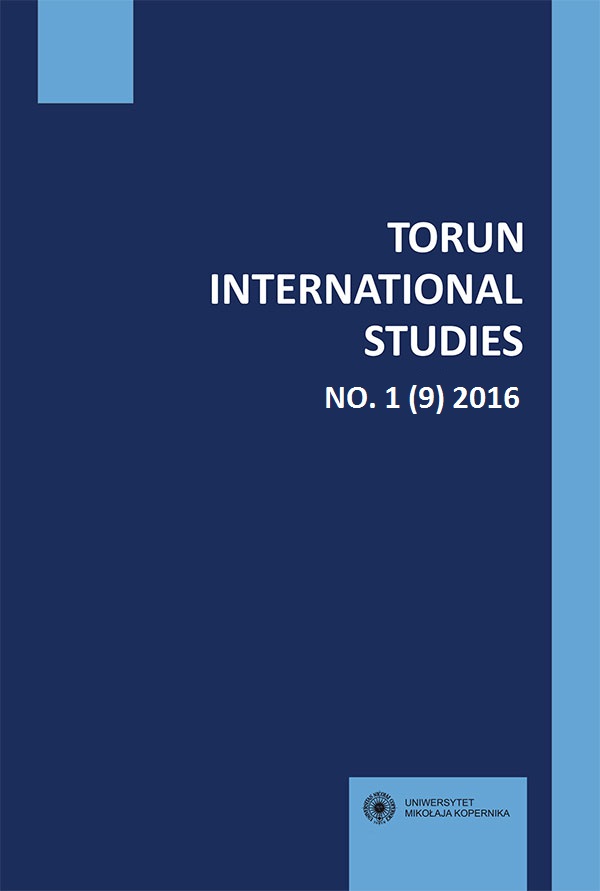POSITIONS OF THE VISEGRAD FOUR COUTRIES AND THE BALTIC STATES ON THE RUSSIAN-UKRAINIAN CONFLICT
DOI:
https://doi.org/10.12775/TIS.2016.002Keywords
Russian-Ukrainian conflict, Ukrainian crisis, Central European States, sanctions, condemnationAbstract
The article analyses the positions of the Visegrad Group and the Baltic countries on the Russia-Ukraine conflict that erupted in 2014. The authors prove that Poland, Lithuania, Estonia and Latvia are united by perception that the Russian aggression in Ukraine is a threat to their national security, they support for tough policy of anti-Russian sanctions in the international arena, and assist Ukraine and the level of declarations and at the level of action. Nonetheless , level of their participation and support for Ukraine depends on their actual capabilities and domestic and foreign policy priorities. Reactions of other V4 countries to events in Ukraine are more restrained and vary from quiet pragmatism in Slovakia to clear pro-Russian voices in the Czech Republic and Hungary. It is unlikely, however, that their position can be a real obstacle to the implementation of the common EU action in the near future.References
Baranowski, M. & Cichocki B. (2015). Poland: Searching for a Strategic Response. In J. Forbrig (Ed.), A Region Disunited? Central European Responses to the Russia-Ukraine Crisis (pp. 34–38). Washington: The German Marshall Fund of the United States, European Policy Paper 1/2015.
Bērziņa, K. (2015). Latvia: EU Presidency at a Time of Geopolitical Crisis. In J. Forbrig (Ed.), A Region Disunited? Central European Responses to the Russia-Ukraine Crisis (pp. 25–28). Washington: The German Marshall Fund of the United States, European Policy Paper 1/2015.
Borysfen Intel. (2015, December 5). “Visegrad Four” and Ukraine: Fall Trends. Independent Analytical Center For Geopolitical Studies. Retrieved January 31, 2016, from http:// bintel.com.ua/uk/article/visefrad2/
Duleba, A. (2015). Slovakia: Ambiguity in Action. In J. Forbrig (Ed.), A Region Disunited? Central European Responses to the Russia-Ukraine Crisis (pp. 43–46). The German Marshall Fund of the United States, European Policy Paper 1/2015.
Finance.net. (2014). Ziņojums: Latvijas un Krievijas attiecību pasliktināšanās gadījumā transporta nozares zaudējumi var sasniegt vienu miljardu eiro. November 25.
Gniazdowski, M., Groszkowski, J., & Sadecki, A. (2014). Wyszehradzka kakofonia wobec konfliktu rosyjsko-ukraińskiego. Ośrodek Studiów Wschodnich im. Marka Karpia. Retrieved January 31, 2016, from http://www.osw.waw.pl/pl/publikacje/analizy/2014-09-10/ wyszehradzka-kakofonia-wobec-konfliktu-rosyjsko-ukrainskiego
Jurkonis, V. (2015). Lithuania: A Staunch Supporter of a European Ukraine. In J. Forbrig (Ed.), A Region Disunited? Central European Responses to the Russia-Ukraine Crisis (pp. 29–33). Washington: The German Marshall Fund of the United States, European Policy Paper 1/2015.
Kramer, A. (2014). The Visegrad Group’s Position Towards the Ukrainian Crisis. An Analysis, Department of Political Science and International Relations, Faculty of Philosophy and Arts, University of West Bohemia in Pilsen.
Kyrydon, A. & Troian, S. (2015). Suczasnyi etap ukrainsko-polskych vidnosyn: dyskurs vzaiemodii. Zovnishni spravy, 1, pp. 48–53.
Latvian Public Broadcasting. (2014). No arms to Ukraine, vows PM. November 25.
Loginov, Y. (2015). Slovaczczyna: druzhyty z Rosiieiu, dopomagaty Ukraini. Dzerkalo tyzhnia. Ukraina, 26, 17 lypnia.
Lopatka, J. & Santa, M. (2014). Slovakia nurtures special ties to Russia, despite EU sanctions. Reuters. Retrieved January 31, 2016, from http://uk.reuters.com/article/uk-ukraine-crisis-slovakia-idUKKBN0E21W920140522
Maigre, M. (2015). Estonia: In Pursuit of a Value-Based Foreign Policy. In J. Forbrig (Ed.), A Region Disunited? Central European Responses to the Russia-Ukraine Crisis (pp. 16–20). Washington: The German Marshall Fund of the United States, European Policy Paper 1/2015.
Markowic, F. (2014, September 5). What lies behind Visegrad Four’s different positions towards Ukraine and Russia? European Public Affairs. Retrieved January 31, 2016, from http:// www.europeanpublicaffairs.eu/what-lies-behind-visegrad-fours-different-positions-towards-ukraine-and-russia/
Pravda. (2015, April 14). Fico: Nikdy nep?jdeme proti jednote EU a NATO. Retrieved January 31, 2016, from http://spravy.pravda.sk/domace/clanok/351925-fico-nikdy-nepojdeme-proti-jednote-eu-a-nato/
Racz, A. (2014). Divided Stands the Visegrad? The V4 have been united towards the Ukraine crisis but remain split concerning Russia. The Finnish Institute of International Affairs. FIIA Briefing Paper 158.
Radiosvoboda.ua. (2014). Presydent Chekhii khoche dla Ukrainy finliandyzatsii. Retrieved January 31, 2016, from http://www.radiosvoboda.org/content/article/26709814.html.
Rzeczpospolita. (2015). Polska na granicy zdrady, January 21.
The World Bank. (2016). Military expenditure (% of GDP). Retrieved January 31, 2016, from http://data.worldbank.org/indicator/MS.MIL.XPND.GD.ZS.
Ua.112. (2015). Yak susidni krainy dopomagaiut Ukraini protystoiaty rosiiskii agresii. Retrieved August 28, 2015, from ua.112.ua/220695.htm.
Downloads
Published
How to Cite
Issue
Section
Stats
Number of views and downloads: 449
Number of citations: 0



